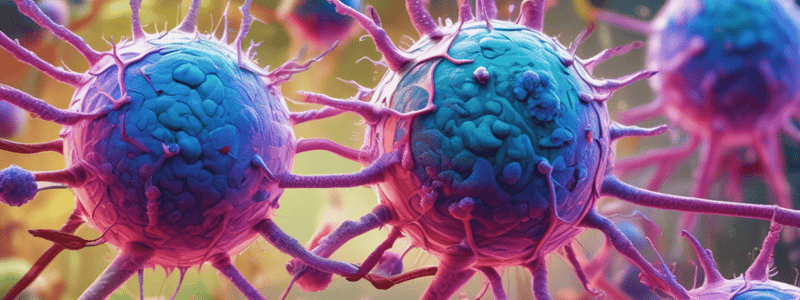Podcast
Questions and Answers
What is the main difference between natural (innate) immunity and acquired (adaptive) immunity?
What is the main difference between natural (innate) immunity and acquired (adaptive) immunity?
- Natural immunity is the first line of defense, while acquired immunity is the third line of defense.
- Natural immunity is present at birth, while acquired immunity develops after birth. (correct)
- Natural immunity is non-specific, while acquired immunity is specific.
- Natural immunity produces a specific response, while acquired immunity produces a broad response.
What is the second line of defense in the immune system?
What is the second line of defense in the immune system?
- Antibody production
- Activation of T-cells
- Inflammatory responses and activation of phagocytes (correct)
- Chemical and physical barriers
Which of the following is an example of passive acquired immunity?
Which of the following is an example of passive acquired immunity?
- Receiving an immunization
- Contracting a disease
- The body producing its own antibodies
- Receiving an infusion of plasma (correct)
Why does increased age reduce the ability of the immune system to respond to infection?
Why does increased age reduce the ability of the immune system to respond to infection?
What is the main reason women are twice as likely as men to have autoimmune disorders?
What is the main reason women are twice as likely as men to have autoimmune disorders?
What is the primary function of the chemical and physical barriers in the immune system?
What is the primary function of the chemical and physical barriers in the immune system?
Which type of acquired immunity involves the body producing its own antibodies?
Which type of acquired immunity involves the body producing its own antibodies?
How does natural (innate) immunity differ from acquired (adaptive) immunity in terms of specificity?
How does natural (innate) immunity differ from acquired (adaptive) immunity in terms of specificity?
What is the main function of the inflammatory response in the immune system?
What is the main function of the inflammatory response in the immune system?
How does the immune system's ability to respond to infection change with increased age?
How does the immune system's ability to respond to infection change with increased age?
What is the primary reason the body responds slower to infection in the elderly?
What is the primary reason the body responds slower to infection in the elderly?
Which of the following is NOT a factor that can affect immune response?
Which of the following is NOT a factor that can affect immune response?
What is the main purpose of lymph node assessment?
What is the main purpose of lymph node assessment?
What is the main difference between lymphadenopathy and lymphadenitis?
What is the main difference between lymphadenopathy and lymphadenitis?
Which laboratory finding is most indicative of an allergic response?
Which laboratory finding is most indicative of an allergic response?
What is the main advantage of RAST testing compared to skin testing for allergies?
What is the main advantage of RAST testing compared to skin testing for allergies?
What is the most important precaution to take when preparing a patient for allergy testing?
What is the most important precaution to take when preparing a patient for allergy testing?
Which type of hypersensitivity reaction occurs immediately upon exposure to an antigen?
Which type of hypersensitivity reaction occurs immediately upon exposure to an antigen?
What is the most important treatment for Type I (Anaphylactic) hypersensitivity reactions?
What is the most important treatment for Type I (Anaphylactic) hypersensitivity reactions?
Which of the following is NOT a common factor that can affect immune response?
Which of the following is NOT a common factor that can affect immune response?
Which of the following is the most dangerous allergic reaction?
Which of the following is the most dangerous allergic reaction?
What is the initial medication given for treating anaphylaxis?
What is the initial medication given for treating anaphylaxis?
Which of the following is a common side effect of antihistamines?
Which of the following is a common side effect of antihistamines?
What type of allergic reaction is characterized by the involvement of T-cells and macrophages, rather than antibodies?
What type of allergic reaction is characterized by the involvement of T-cells and macrophages, rather than antibodies?
Which of the following is an example of a Type V (Antibody-Mediated/Stimulated) allergic reaction?
Which of the following is an example of a Type V (Antibody-Mediated/Stimulated) allergic reaction?
What is the recommended management for a patient experiencing anaphylactic shock?
What is the recommended management for a patient experiencing anaphylactic shock?
Which of the following is a common trigger for allergic reactions?
Which of the following is a common trigger for allergic reactions?
What is the action of epinephrine that makes it effective in treating anaphylaxis?
What is the action of epinephrine that makes it effective in treating anaphylaxis?
Which of the following is a clinical manifestation of a Type IV (Delayed or Cellular) allergic reaction?
Which of the following is a clinical manifestation of a Type IV (Delayed or Cellular) allergic reaction?
What is the recommended management for a Type IV (Delayed or Cellular) allergic reaction?
What is the recommended management for a Type IV (Delayed or Cellular) allergic reaction?
Flashcards are hidden until you start studying




